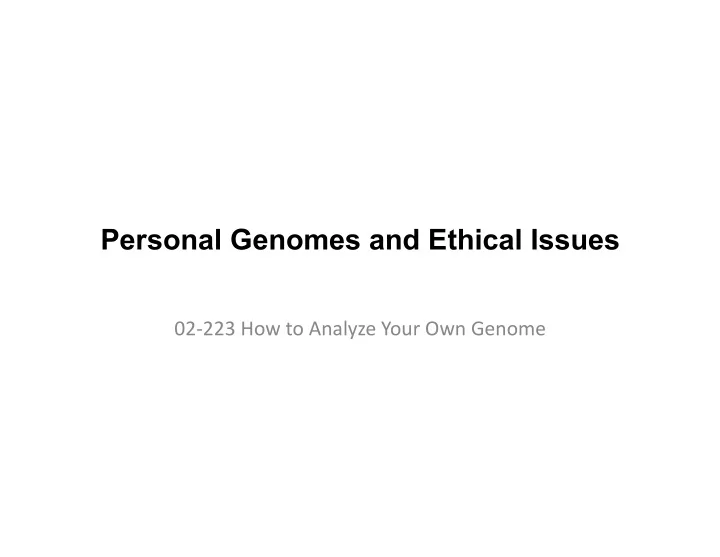

Personal Genomes and Ethical Issues 02-‑223 ¡How ¡to ¡Analyze ¡Your ¡Own ¡Genome ¡
Declining Cost of Genome Sequencing • The ¡genome ¡sequencing ¡is ¡expected ¡to ¡happen ¡rouAnely ¡in ¡ the ¡near ¡future ¡ ¡
Schadt, ¡MSB, ¡2012 ¡ The ¡era ¡of ¡big ¡data : ¡the ¡genome ¡data ¡are ¡already ¡being ¡collected ¡in ¡a ¡ large ¡scale ¡and ¡being ¡mined ¡for ¡scienAfic ¡discovery ¡to ¡drive ¡more ¡ accurate ¡descripAve ¡and ¡predicAve ¡models ¡that ¡inform ¡decision ¡ making ¡for ¡the ¡best ¡diagnosis ¡and ¡treatment ¡choice ¡for ¡a ¡given ¡paAent. ¡ ¡
Would ¡you ¡post ¡your ¡genome ¡on ¡the ¡web? ¡
Genomes and Privacy • DNA ¡sequence ¡data ¡contain ¡informaAon ¡that ¡can ¡be ¡used ¡to ¡ uniquely ¡idenAfy ¡an ¡individual ¡(i.e., ¡genome ¡sequences ¡are ¡ like ¡fingerprints) ¡ • Balancing ¡the ¡need ¡for ¡scienAfic ¡study ¡and ¡privacy ¡
Genomes and Privacy • Privacy ¡concerns ¡ – Genome ¡sequence ¡data ¡and ¡other ¡related ¡types ¡of ¡data ¡(gene ¡ expressions, ¡clinical ¡records, ¡epigeneAc ¡data, ¡etc.) ¡are ¡collected ¡for ¡a ¡ large ¡number ¡of ¡paAents ¡for ¡medical ¡research ¡ – Most ¡types ¡of ¡data ¡are ¡freely ¡available ¡through ¡internet ¡ except ¡for ¡ genotype ¡data ¡ ¡ • NCBI ¡GEO ¡database ¡for ¡gene ¡expression ¡data ¡ • The ¡cancer ¡genome ¡atlas ¡data ¡portals ¡ – Genotype ¡data ¡are ¡available ¡to ¡scienAsts ¡through ¡restricted ¡access ¡ – ProtecAng ¡parAcipants’ ¡privacy ¡through ¡informed ¡consent ¡ ¡ ¡
hWps://tcga-‑data.nci.nih.gov/tcga/tcgaHome2.jsp ¡ The Cancer Genome Atlas (TCGA) Data
The Cancer Genome Atlas (TCGA) Data hWps://tcga-‑data.nci.nih.gov/tcga/tcgaCancerDetails.jsp? diseaseType=LAML&diseaseName=Acute%20Myeloid%20Leukemia ¡
Access Control for TCGA Data • Open ¡access ¡data ¡Aer ¡ – De-‑idenAfied ¡clinical ¡and ¡demographic ¡data ¡ – Gene ¡expression ¡data ¡ – Copy-‑number ¡alteraAons ¡in ¡regions ¡of ¡the ¡genome ¡ – EpigeneAc ¡data ¡ – Summaries ¡of ¡data, ¡such ¡as ¡genotype ¡frequencies, ¡compiled ¡across ¡ individuals ¡ • Controlled-‑access ¡data ¡Aer ¡ – Individual ¡germline ¡variant ¡data ¡ – DNA ¡sequence ¡data ¡ – One ¡should ¡apply ¡for ¡an ¡access ¡to ¡the ¡data ¡through ¡NIH ¡(database ¡of ¡ genotypes ¡and ¡phenotypes) ¡
Informed Consent for Scientific Research • Standard ¡pracAce ¡for ¡enrolling ¡human ¡subjects ¡in ¡a ¡research ¡ study ¡ ¡ – fully ¡informing ¡potenAal ¡parAcipants ¡on ¡all ¡aspects ¡of ¡a ¡study ¡including ¡ the ¡aims ¡of ¡the ¡study, ¡risks, ¡benefits, ¡costs, ¡and ¡protecAon ¡of ¡personal ¡ privacy ¡ – The ¡origins ¡of ¡modern ¡day ¡informed ¡consent ¡for ¡medical ¡research ¡can ¡ be ¡traced ¡to ¡the ¡Nuremberg ¡Code ¡in ¡1947 ¡in ¡an ¡effort ¡to ¡protect ¡ parAcipants ¡in ¡research ¡studies ¡(Homan, ¡1991). ¡ ¡
Nuremberg Code • Research ¡ethics ¡principles ¡for ¡human ¡experimentaAon ¡ ¡ • Established ¡ader ¡the ¡Nuremberg ¡Trials ¡at ¡the ¡end ¡of ¡the ¡ Second ¡World ¡War ¡ hWp://www.hhs.gov/ohrp/archive/nurcode.html ¡
Nuremberg Code • On ¡August ¡19, ¡1947, ¡the ¡judges ¡of ¡the ¡American ¡military ¡tribunal ¡in ¡the ¡case ¡of ¡the ¡ USA ¡vs. ¡Karl ¡Brandt ¡et. ¡al. ¡delivered ¡their ¡verdict. ¡Before ¡announcing ¡the ¡guilt ¡or ¡ innocence ¡of ¡each ¡defendant, ¡they ¡confronted ¡the ¡difficult ¡quesAon ¡of ¡medical ¡ experimentaAon ¡on ¡human ¡beings. ¡Several ¡German ¡doctors ¡had ¡argued ¡in ¡their ¡ own ¡defense ¡that ¡their ¡experiments ¡differed ¡liWle ¡from ¡previous ¡American ¡or ¡ German ¡ones. ¡Furthermore ¡they ¡showed ¡that ¡no ¡internaAonal ¡law ¡or ¡informal ¡ statement ¡differenAated ¡between ¡legal ¡and ¡illegal ¡human ¡experimentaAon. ¡This ¡ argument ¡worried ¡Drs. ¡Andrew ¡Ivy ¡and ¡Leo ¡Alexander, ¡American ¡doctors ¡who ¡had ¡ worked ¡with ¡the ¡prosecuAon ¡during ¡the ¡trial. ¡On ¡April ¡17, ¡1947, ¡Dr. ¡Alexander ¡ submiWed ¡a ¡memorandum ¡to ¡the ¡United ¡States ¡Counsel ¡for ¡War ¡Crimes ¡which ¡ outlined ¡six ¡points ¡defining ¡legiAmate ¡research. ¡The ¡verdict ¡of ¡August ¡19 ¡reiterated ¡ almost ¡all ¡of ¡these ¡points ¡in ¡a ¡secAon ¡enAtled ¡"Permissible ¡Medical ¡Experiments" ¡ and ¡revised ¡the ¡original ¡six ¡points ¡into ¡ten. ¡Subsequently, ¡the ¡ten ¡points ¡became ¡ known ¡as ¡the ¡"Nuremberg ¡Code." ¡Although ¡the ¡code ¡addressed ¡the ¡defense ¡ arguments ¡in ¡general, ¡remarkably ¡none ¡of ¡the ¡specific ¡findings ¡against ¡Brandt ¡and ¡ his ¡codefendants ¡menAoned ¡the ¡code. ¡Thus ¡the ¡legal ¡force ¡of ¡the ¡document ¡was ¡ not ¡well ¡established. ¡The ¡uncertain ¡use ¡of ¡the ¡code ¡conAnued ¡in ¡the ¡half ¡century ¡ following ¡the ¡trial ¡when ¡it ¡informed ¡numerous ¡internaAonal ¡ethics ¡statements ¡but ¡ failed ¡to ¡find ¡a ¡place ¡in ¡either ¡the ¡American ¡or ¡German ¡naAonal ¡law ¡codes. ¡ Nevertheless, ¡it ¡remains ¡a ¡landmark ¡document ¡on ¡medical ¡ethics ¡and ¡one ¡of ¡the ¡ most ¡lasAng ¡products ¡of ¡the ¡"Doctors ¡Trial." ¡ hWp://www.ushmm.org/informaAon/exhibiAons/online-‑features/special-‑focus/doctors-‑trial/ nuremberg-‑code ¡
Institutional Review Board (IRB) • A ¡commiWee ¡that ¡has ¡been ¡formally ¡designated ¡to ¡approve, ¡ monitor, ¡and ¡review ¡biomedical ¡and ¡behavioral ¡research ¡ involving ¡humans ¡ • Title ¡45 ¡Code ¡of ¡Federal ¡RegulaAons ¡Part ¡46 ¡ – hWp://www.hhs.gov/ohrp/humansubjects/guidance/45cfr46.html ¡
Current Generation Informed Consents • Single ¡study ¡focused ¡ • Top-‑down ¡unidirecAonal ¡researcher-‑parAcipant ¡(research ¡subject) ¡ relaAonship. ¡ ¡ ¡ • ProtecAng ¡the ¡parAcipant ¡is ¡considered ¡among ¡the ¡chief ¡aims ¡ • Data ¡generaAon ¡on ¡study ¡parAcipants ¡usually ¡an ¡integral ¡part ¡of ¡the ¡ consent ¡ • Data ¡ownership ¡and ¡terms ¡of ¡use ¡driven ¡by ¡the ¡invesAgator ¡and/or ¡hosAng ¡ insAtuAon ¡ • Study ¡parAcipants ¡are ¡counseled ¡to ¡ensure ¡they ¡understand ¡all ¡aspects ¡of ¡ the ¡study, ¡although ¡no ¡evidence ¡of ¡understanding ¡is ¡sought ¡or ¡required ¡ • In ¡most ¡cases, ¡anonymity, ¡privacy, ¡and ¡confidenAality ¡are ¡guaranteed ¡as ¡a ¡ key ¡condiAon ¡for ¡a ¡parAcipant’s ¡consent ¡ • Big ¡data, ¡more ¡open ¡data ¡sharing ¡mentality ¡demand ¡a ¡new ¡genera<on ¡of ¡ informed ¡consents ¡
Genomes and Privacy • How ¡much ¡should ¡we ¡be ¡concerned ¡about ¡the ¡privacy ¡issues ¡ regarding ¡personal ¡genome ¡data? ¡ • Non-‑geneAc ¡data ¡can ¡be ¡used ¡to ¡predict ¡the ¡genotypes ¡of ¡ individuals ¡ (Bayesian ¡method ¡to ¡predict ¡individual ¡SNP ¡genotypes ¡from ¡gene ¡ expression ¡data, ¡Schadt ¡et ¡al. ¡Nature ¡GeneAcs, ¡2012) ¡ – Uses ¡gene ¡expressions ¡as ¡non-‑geneAc ¡data ¡and ¡predicts ¡the ¡genotypes ¡ based ¡on ¡the ¡gene ¡expressions ¡
Recommend
More recommend